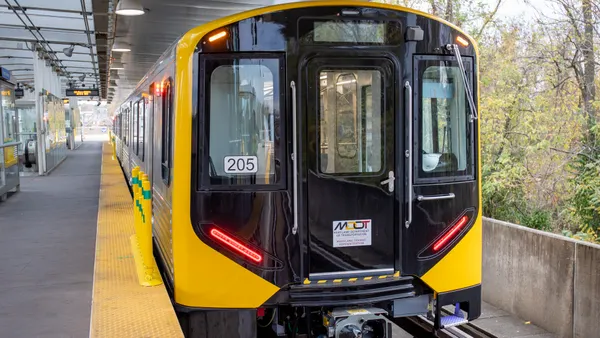Dive Brief:
- Ford is shutting down its current GoRide Health non-emergency medical transportation service.
- Although the service will end in the five cities where it operated, a new GoRide Health pilot program will emerge in select cities where Ford intends to launch autonomous vehicles, a Ford spokesperson told Smart Cities Dive via email. The new program will begin in Miami at a to-be-determined date. "Ford is committed to improving access to transportation for those with limited mobility. The planned Miami pilot will help Ford better understand the role AVs can play in this important transport sector," a company statement said.
- This spring, GoRide expanded from the Detroit area into four Ohio cities. Service in Cincinnati, Cleveland and Toledo already has ceased; it ends in Dayton this week and in Detroit next week, according to the website.
Dive Insight:
The shutdown announcement — which comes just months after Ford expanded the GoRide Health service into multiple markets — sought to "provide awareness to customers and suppliers as well as to align with internal business deadlines such as supplier contract extensions," Ford's statement says. The company says it shifted its strategy recently based on what it has learned from the GoRide Health program thus far, though it is not releasing many details about the reasoning for the shutdown or the new AV pilot program.
Ford does note a commitment to improving transportation access for people with limited mobility, and the GoRide system reflected an emerging industry-wide shift to provide services to people with different abilities. Mobility innovations have emerged at a rapid pace over the past decade, but most of them are designed for individuals without mobility restrictions — at least initially. For example, e-scooters are seen as a mobility innovation but are not useful for people who can't stand or have balance issues.
As industries mature, they often make greater attempts to accommodate consumers who have been left behind. A prime example is the evolution of bike-sharing, which has been around for about a decade. Cities including Oakland, CA; Detroit and Portland, OR increasingly are adding adaptive bikes to their programs to accommodate more users.
GoRide Health is an expanded service that emerged from the ride-hailing industry, which also is nearly a decade old. Uber and Lyft both launched their own programs to provide customers with non-emergency trips to medical appointments. Partnerships with medical facilities have helped to advance this sector; ride-hailing services help to decrease the number of patient no-shows, which are expensive for medical facilities. The programs increase equity for patients who need medical care but do not have access to reliable or reasonably priced transportation.










